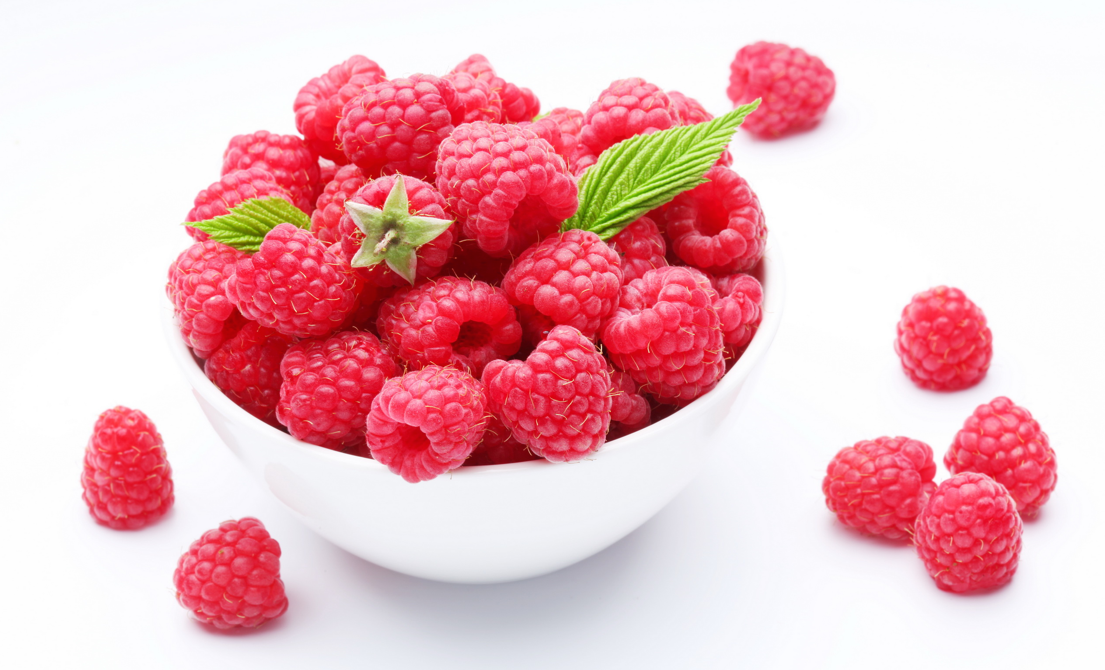Raspberries are juicy little berries that pack a flavorful punch, the health benefits of eating raspberries are many. They are considered a mid-summer season fruit.
Let’s look at health benefits of eating raspberries:
Anti-inflammatory properties:
Organic raspberries are packed with antioxidants that provide anti-inflammatory benefits.
The health benefits of eating raspberries are numerous as their anti-inflammatory properties make they stand apart from the rest. Inflammation is a major factor for chronic pain and disease. A study published in Food and Chemical Toxicology shows that extracts from raspberries help inhibit the activity of COX-2, an enzyme that causes inflammation.
Antioxidant rich:
Organic raspberries are an excellent source of antioxidants such as anthocyanins, flavanols, flavonoids, tannins, and so much more.
Antioxidants protect the body from the effects of oxidative stress, which may help strengthen the immune system and ward off diseases.
Dr. Andrew Weil explains, “Oxidative stress is the total burden placed on organisms by the constant production of free radicals in the normal course of metabolism plus whatever other pressures the environment brings to bear (natural and artificial radiation, toxins in air, food and water; and miscellaneous sources of oxidizing activity, such as tobacco smoke).”
The effects of oxidative stress are often linked to chronic illnesses such as heart disease and many types of cancers.
Blood sugar regulation:
One more important health benefits of eating raspberries is its the fact that they can regulate blood sugar.
Alpha-glucosidase is a digestive enzyme that breaks down the starches we eat into sugars. When this happens, a lot of blood sugar is released into our blood stream and it can cause blood sugar spikes.
A study published in Food Chemistry shows that raspberries can inhibit this digestive enzyme, and may prevent blood sugar spikes.
Cancer prevention:
Because of the potent anti-inflammatory and antioxidant properties of organic raspberries, they are considered powerful foods for preventing cancer. According to the American Institute of Cancer Research, “All berries, but particularly strawberries and raspberries, are rich in ellagic acid. In laboratory studies, this phytochemical has shown the ability to prevent cancers of the skin, bladder, lung, esophagus and breast.”
Weight loss:
One of the newest and most exciting areas of research on raspberries is their effect on obesity. Extracts from raspberries increases metabolism in our fat cells and increases heat production. Because of these effects, eating raspberries can help your body burn fat.
Tips: Try eating a handful as a snack instead of candy or sugary snacks. They are also great in infused water recipes like our organic raspberry and mint infused water.
AS ALWAYS: Check with your health practitioner before you change your diet. This organic food is not meant to replace any treatment or drugs you are taking.
DON’T FORGET to sign up for our weekly newsletter to get our latest articles, updates, free recipes and giveaways.
For a raspberry and mint infused water.
For a raw strawberry jam recipe.
REFERENCES:
1. “Foods That Fight Cancer.” AICR.org. American Institute for Cancer Research, n.d. Web. 22 July 2014.
2. “Nutrition Facts and Analysis for Raspberries, Raw.” Self Nutrition Data. Self Nutrition Data, n.d. Web. 20 July 2014.
3. “A Black Raspberry Extract Inhibits Proliferation and Regulates Apoptosis in Cervical Cancer Cells.” Science Direct. Gynecologic Oncology, Nov. 2011. Web. 22 July 2014.
4. “Variation of Total Phenolics, Anthocyanins, Ellagic Acid and Radical Scavenging Capacity in Various Raspberry (Rubus Spp.) Cultivars.” Science Direct. Food Chemistry, June 2012. Web. 22 July 2014.
5. “Tiliroside, a Glycosidic Flavonoid, Ameliorates Obesity-induced Metabolic Disorders via Activation of Adiponectin Signaling Followed by Enhancement of Fatty Acid Oxidation in Liver and Skeletal Muscle in Obese-diabetic Mice.” National Center for Biotechnology Information. Journal of Nutritional Biochemistry, July 2012. Web. 22 July 2014.
6. “Rheosmin, a Naturally Occurring Phenolic Compound Inhibits LPS-induced INOS and COX-2 Expression in RAW264.7 Cells by Blocking NF-kappaB Activation Pathway.” Unbound MEDLINE. Food and Chemical Toxicology, n.d. Web. 22 July 2014.
7. “Anti-oxidant, Anti-proliferative and Anti-inflammatory Activities of the Extracts from Black Raspberry Fruits and Wine.” Science Direct. Food Chemistry, 15 Nov. 2010. Web. 22 July 2014.
8. “Berry Polyphenols Inhibit Pancreatic Lipase Activity in Vitro.” Science Direct. Food Chemistry, 01 July 2009. Web. 22 July 2014.
9. “Anti-obese Action of Raspberry Ketone.” National Center for Biotechnology Information. Life Sciences, 27 May 2005. Web. 22 July 2014.
10. “Raspberry Ketone Increases Both Lipolysis and Fatty Acid Oxidation in 3T3-L1 Adipocytes.” National Center for Biotechnology Information. Planta Medica, Oct. 2010. Web. 21 July 2014.
11. “Inhibitory Effect of Raspberries on Starch Digestive Enzyme and Their Antioxidant Properties and Phenolic Composition.” Science Direct. Food Chemistry, 15 Mar. 2010. Web. 22 July 2014.

















